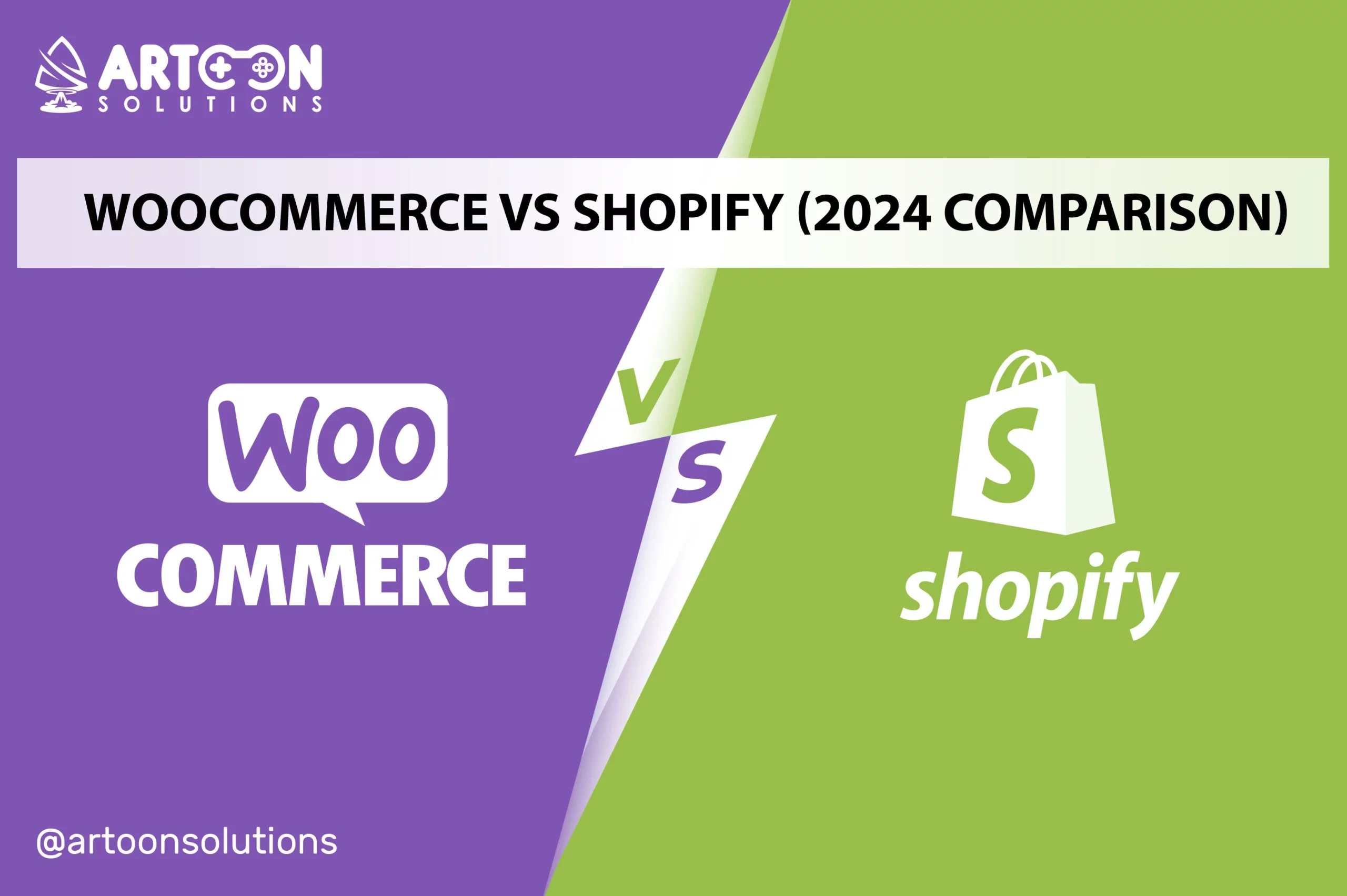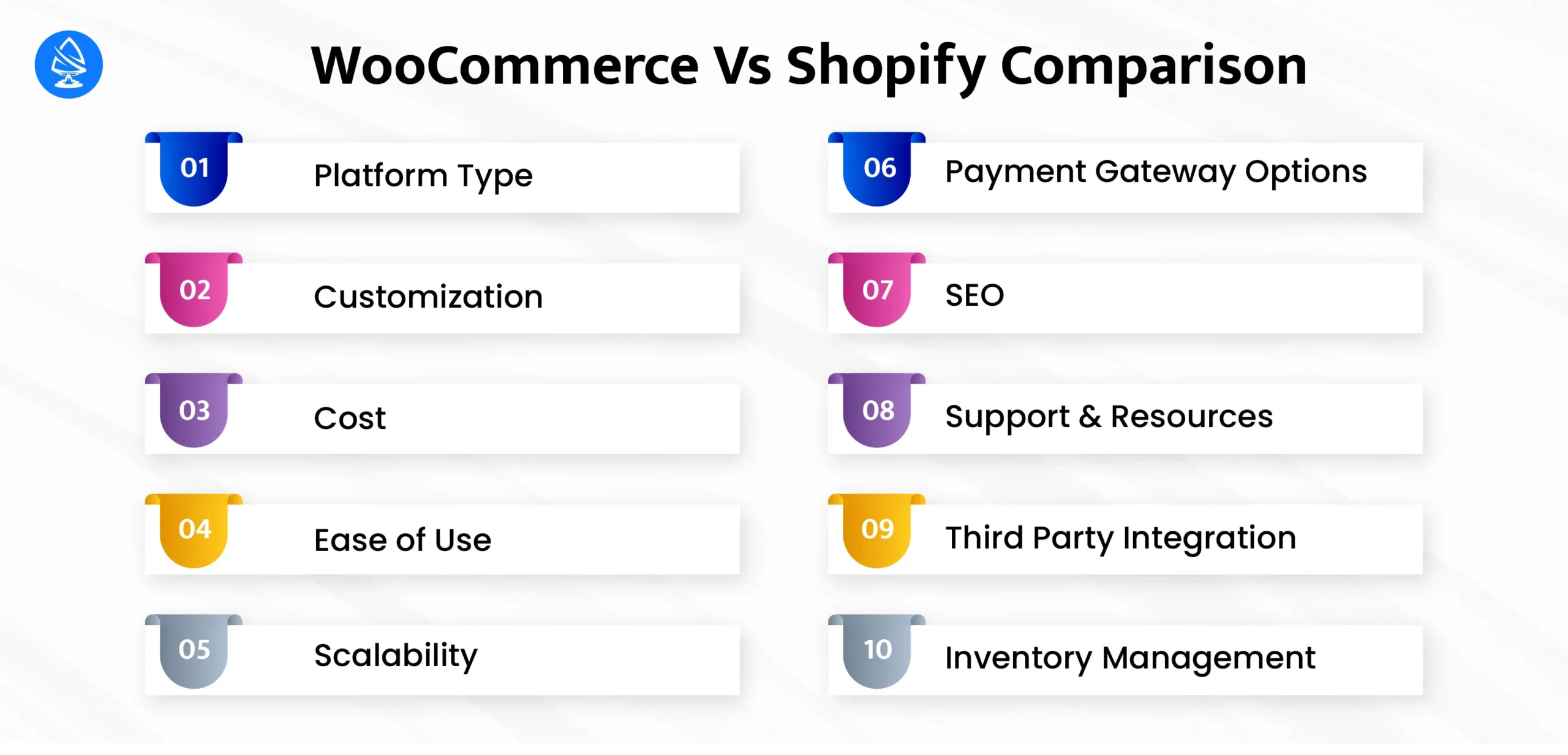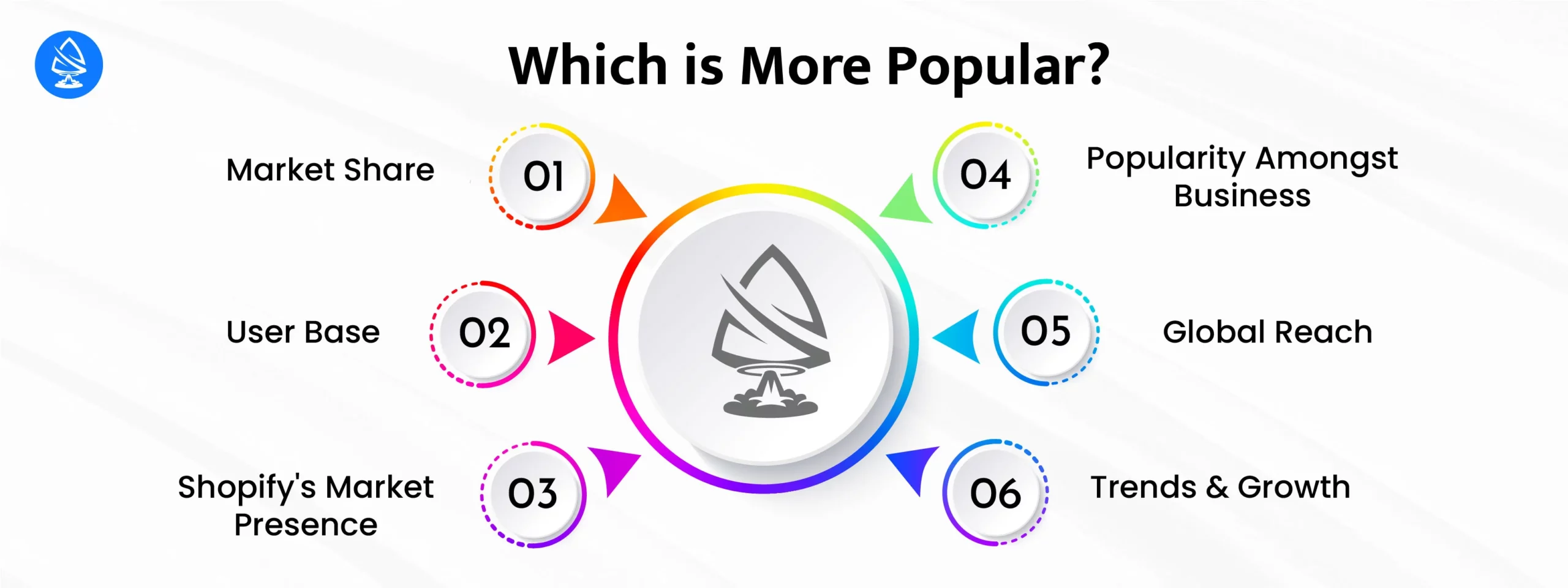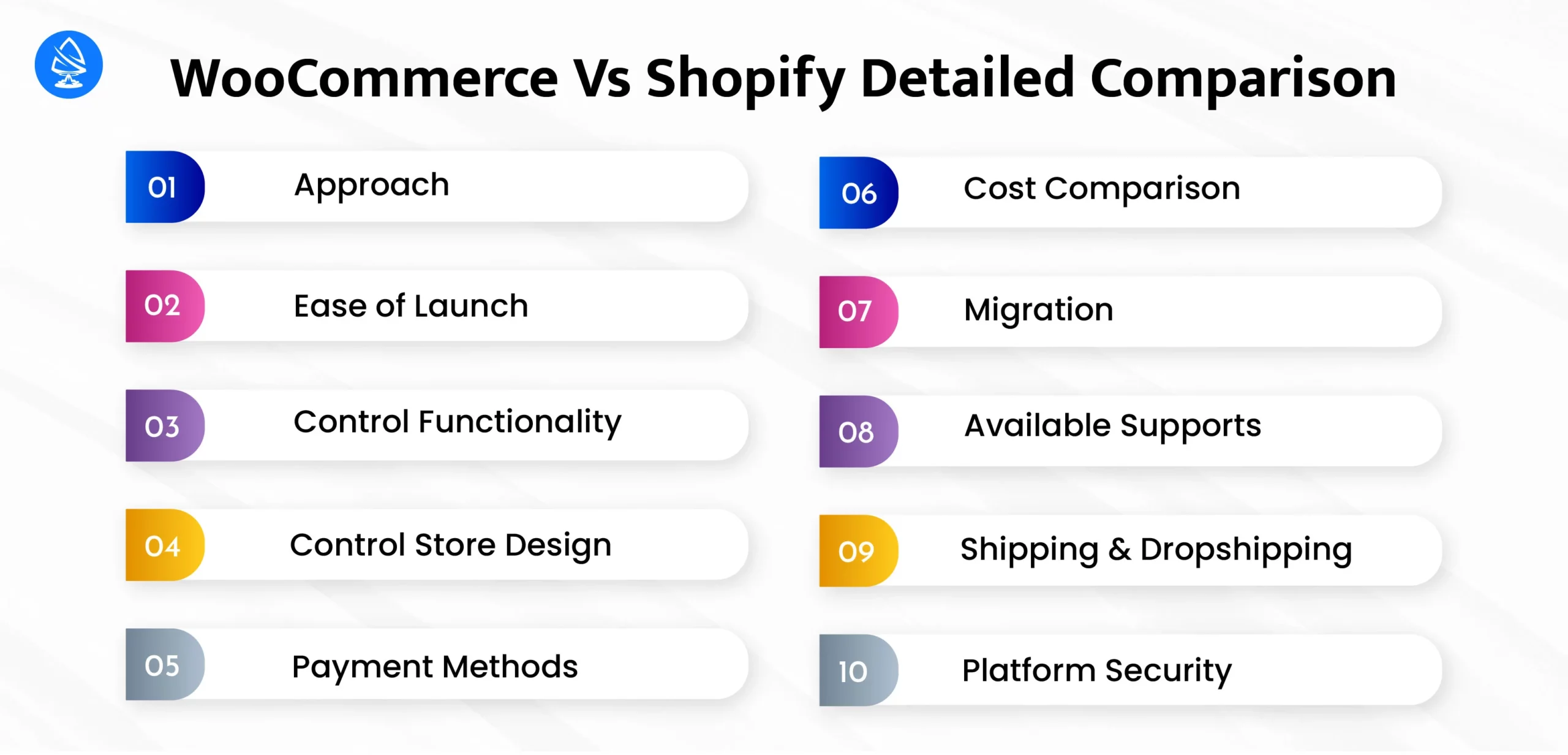- HR:+91-879-9184-787
- Sales:+91-908-163-7774

Confused between WooCommerce Vs Shopify? WooCommerce and Shopify are two popular e-commerce platforms that help businesses set up and run online stores. WooCommerce is a plugin for WordPress which makes it a go-to choice for those who are already familiar with the WordPress ecosystem. Shopify is a standalone platform that provides a complete e-commerce solution. It also includes hosting & domain services. Both platforms offer various features and a lot of customization to help businesses create and manage their online stores efficiently. If you don’t know the difference between Wix vs WordPress or find alternatives such as Shopify or WooCommerce, you’re at the right place. In this detailed comparison, We will dive into the differences and similarities between Woocommerce and Shopify offers to you for your e-commerce venture.

WooCommerce is an open-source plugin which is designed for WordPress websites. It will help your businesses to set up online stores. You can integrate the plugin with WordPress and it’s easy to use, which helps you to sell your products on existing websites or you can start a new site. You can manage all your products, keep track of inventory, accept payments, and handle shipping. Plus, You can enhance your store with extra features and customize design by using other extensions available through WooCommerce.
Read More: What is WooCommerce? 10 Reasons to Choose It

Shopify is a leading e-commerce platform that helps businesses create and manage online stores without the need for extensive technical knowledge. It is a fully hosted solution which means that Shopify takes care of hosting, security, and technical aspects. It allows users to focus on building and growing their business without any other distractions. Shopify has a user-friendly interface that offers a wide range of built-in features including product management, order management, payment processing & customizable storefront designs. Additionally, Shopify provides access to a variety of apps and integration to enhance the platform’s functionality and meet your business needs.

We can consider a Shopify vs. WooCommerce comparison based on lots of factors, which are discussed below.
WooCommerce is a plugin for WordPress which is a self-hosted solution, while Shopify is a fully hosted platform.
WooCommerce offers extensive customization options due to its open-source nature and integration with WordPress themes and plugins. In contrast, Shopify provides a more streamlined and user-friendly interface with limited customization options.
WooCommerce is a free WordPress plugin, but users have to spend for hosting, domain, themes, and extensions. On the other hand, Shopify has monthly subscription plans which vary in cost based on features and transaction fees.
Shopify is known for its intuitive interface and ease of use which make it suitable for beginners without technical knowledge. WooCommerce requires more technical expertise due to its integration with WordPress.
Shopify offers scalable plans with built-in features to accommodate business growth. WooCommerce’s scalability depends on the hosting provider and WordPress capabilities.
WooCommerce supports various payment gateways which include PayPal, Stripe, and others, while Shopify has its built-in payment gateway but also supports third-party gateways.
WooCommerce offers better SEO capabilities due to its integration with WordPress. It allows for more control over SEO elements. Shopify provides basic SEO features but may not offer as much flexibility.
Shopify offers 24/7 customer support via live chat, email, and phone, along with extensive documentation and community forums. WooCommerce’s support depends on hosting providers and community forums with limited official support.
Both platforms offer integrations with third-party apps and services, but WooCo
mmerce has more options due to its open-source nature and WordPress ecosystem.
Both WooCommerce and Shopify help you manage your inventory, but they do it differently. Shopify comes with built-in tools for managing inventory, while WooCommerce might need extra plugins if you want more advanced features or customization.

WooCommerce holds a significant market share in the e-commerce industry amongst small to medium-sized businesses. Its integration with WordPress powered over 40% of websites globally which contributes to its popularity.
WooCommerce has a large user base, you’ll benefit from the vast WordPress community and its reputation as it is the most widely used content management system (CMS). This extensive user base indicates a strong preference for WooCommerce among website owners seeking e-commerce functionality.
Shopify has a smaller market share as compared to WooCommerce, but it has a substantial presence, particularly among startups and larger enterprises. Shopify attracts businesses who are looking for all-in-one e-commerce solutions for their business due to its user-friendly interface, comprehensive features, and dedicated support.
WooCommerce is favored by businesses with existing WordPress websites or those seeking flexibility and customization. In contrast, Shopify appeals to entrepreneurs and businesses seeking a straightforward e-commerce platform with built-in features and support.
Both WooCommerce and Shopify have a global reach that serves businesses across various industries and geographical locations. However, Shopify’s extensive marketing efforts and partnerships have contributed to its widespread recognition and adoption in the e-commerce ecosystem.
You can analyze trends in e-commerce platform usage and growth rates which provide insights into your popularity over time. You should monitor factors such as user acquisition, churn rates, and market expansion which will help to assess the ongoing popularity and adoption of WooCommerce and Shopify.
When deciding between Shopify or WooCommerce, you should consider your business needs, budget, technical skills, and growth plans. Don’t just go by popularity. Each platform has its own perks and suits different types of online stores. So, you should take your time to analyze the options and choose what’s best for you.

Shopify is an e-commerce platform that is fully hosted and believed to be a comprehensive solution for building and managing online stores. It is user-friendly and provides a range of features that simplify the e-commerce experience for merchants.
WooCommerce is an open-source plugin for WordPress that allows users to transform a website into a fully functional e-commerce store. It offers flexibility, customization, and offers seamless integration for WordPress.
Shopify: Shopify provides a simple setup with customizable themes and pre-built templates that make the process easier for beginners to launch stores.
WooCommerce: WooCommerce provides customization options for your e-commerce store. You should have enough technical knowledge on how to install WordPress and configure plugins.
Shopify: Shopify provides control over various aspects of online stores to their merchants through a range of built-in features and apps.
WooCommerce: WooCommerce allows users to customize stores according to their requirements and offers greater control and flexibility through its extensive range of plugins and extensions.
Shopify: Shopify provides you with customizable themes and a user-friendly drag-and-drop editor for designing store layouts and pages.
WooCommerce: WooCommerce allows you to leverage a vast library of WordPress themes and customize store designs using CSS and HTML.
Merchants worldwide can accept payments from customers using multiple payment gateways, including PayPal, Stripe, and others, with both Shopify and WooCommerce.
Shopify: Shopify has different pricing plans that include monthly subscription fees, transaction fees, and extra charges for apps and add-ons.
WooCommerce: WooCommerce is free, but users need to pay for hosting, domain registration, premium themes, plugins, and extensions.
To migrate between Shopify and WooCommerce, you need to export/import data such as products, customers, orders, and settings. This process requires technical expertise to ensure a seamless transition, although tools and services are available to assist.
Shopify provides 24/7 customer support via live chat, email, and phone, along with extensive documentation and community forums.
WooCommerce offers community support through forums, documentation, and tutorials, along with premium support options from third-party providers.
Both platforms offer built-in shipping and dropshipping solutions, including shipping rate calculation, order fulfillment, and integration with third-party logistics providers.
WooCommerce and Shopify both provide SEO-friendly features to optimize store visibility on search engines. These features include customizable URLs, meta tags, sitemaps, and integrations with SEO plugins.
Both platforms actively prioritize security by implementing SSL encryption, maintaining PCI compliance, and regularly updating security measures to protect customer data and transactions.
WooCommerce and Shopify enable merchants to track stock levels, manage product variations, and automate inventory updates with their inventory management tools.
You have to install WordPress and set it up. It offers flexibility but may require technical knowledge.
It comes with a user-friendly setup and built-in features which is easy for beginners.
WooCommerce: It is a free plugin but costs you for hosting, themes & plugins.
Shopify: You need to pay subscription & transaction fees, as well as additional costs for apps and themes.
WooCommerce: It relies on community support and documentation with limited official support.
Shopify: It offers you 24/7 customer support via various channels, including phone, email, and live chat.
WooCommerce: It will allow you to have full control over SEO settings and integration with WordPress SEO plugins.
Shopify: It offers built-in SEO features but with less control compared to WooCommerce.
WooCommerce: It supports dropshipping with various plugins and integrations.
Shopify: It offers built-in dropshipping features and integration with popular dropshipping apps.
WooCommerce: It provides you with extensive customization options through plugins and themes.
Shopify: It offers customizable themes and a range of apps for additional functionality.
WooCommerce: It provides security depending on WordPress updates and hosting provider measures.
Shopify: It offers secure hosting and regular updates, ensuring a high level of security.
WooCommerce is ideal for users who seek flexibility and control over their e-commerce store, especially those familiar with WordPress.
Shopify is suitable for beginners or users prioritizing ease of use, offering a quick setup process and built-in features for e-commerce.
Artoon Solutions is one of the best WordPress development company out there in the industry. We have been in the industry for more than 14+ years having the best team of experts in our team. We provide the best services to our clients with up-to-date reports on projects with regular updates. Contact Artoon Solutions now for WordPress website maintenance services or hire a WordPress web designer.
In conclusion, when comparing WooCommerce vs Shopify across various factors such as setup cost, support, SEO, dropshipping, and more. It has become clear that WooCommerce is for users who seek flexibility, customization, and control. Especially if they’re already familiar with WordPress. On the other hand, Shopify emerges as a more user-friendly option with comprehensive features, built-in support, and seamless functionality. It is suitable for beginners who want ease of use and convenience. Ultimately, the choice between WooCommerce and Shopify depends upon one’s own preference and technical expertise. If you’re looking for free consulting regarding your ideas or thinking of hiring a WordPress developer then book a call with Artoon Solutions now.
Choosing between Shopify and WooCommerce depends on your needs. Shopify is easier to use but has a monthly cost, while WooCommerce is free to use but requires more technical expertise.
Moving to Shopify depends on factors like budget, technical skills, and store complexity.
WooCommerce is a popular and powerful eCommerce platform.
WooCommerce itself is free, but there are costs for hosting, themes, and plugins.
The wooCommerce plugin is free but you’ll get charged for extensions, domains, themes, etc.
WooCommerce can be a good option for dropshipping with additional setup.
Generally, Shopify has a monthly subscription fee, while WooCommerce is free to use but requires additional costs for hosting and features.
WooCommerce offers extensive customization options and seamless integration with WordPress, but requires technical expertise for setup and may lead to higher hosting costs as the store expands.
WooCommerce can handle 5000 products with proper hosting and optimization.
While WooCommerce offers extensive customization options and integrates seamlessly with WordPress, Shopify, on the other hand, provides a user-friendly experience with comprehensive features and built-in support. However, BigCommerce offers scalability and advanced tools; nonetheless, it may have higher pricing tiers.
Copyright 2009-2025